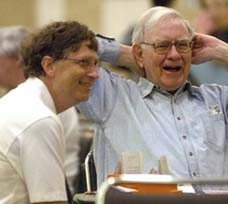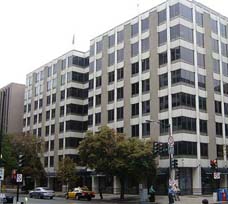
In a speech at the University of Michigan in 1960, the Massachusetts senator challenged young people to dedicate two years of their lives to a service program that would help other people and promote world peace. "Kennedy recognized that if it was just a two-month stint it wouldn’t have the same value to the volunteer or the country," said Garvin. "What the Peace Corps still does is it allows nationals in countries around the world to get to know an individual and see the best of America, someone who is willing to give two years of their life to make a difference. That is extremely powerful."
The Peace Corps experience is a chance "to see yourself through other people’s eyes"
Their time with the Corps
By Carole LaMond/ Staff Writer
Thursday, August 24, 2006
It’s been 14 years since Tim Garvin returned from his service in the Peace Corps, but the experience is still so vivid, and has influenced his life so directly, that it often comes up in conversation.
He frequently discovers he is talking with someone who is a member of the same "amazing fraternity."
"There will be an immediate recognition, and a huge smile," said Garvin who was posted to Jamaica in 1991-92. "You share this bond even if you were in the Peace Corps at different decades in your lives, different years or different countries."
More than 182,000 Peace Corps volunteers have served in 138 host countries since President John F. Kennedy established the service organization on March 1, 1961 to promote international understanding and provide aid to the developing countries of the world.
In a speech at the University of Michigan in 1960, the Massachusetts senator challenged young people to dedicate two years of their lives to a service program that would help other people and promote world peace.
"Kennedy recognized that if it was just a two-month stint it wouldn’t have the same value to the volunteer or the country," said Garvin. "What the Peace Corps still does is it allows nationals in countries around the world to get to know an individual and see the best of America, someone who is willing to give two years of their life to make a difference. That is extremely powerful."
There are at least 25 returned Peace Corps volunteers who live or work in Sudbury, said Garvin, who organized a local reunion of about 20 veterans of the program in March to celebrate the 45th anniversary of the Peace Corps.
A helping hand
The Peace Corps was an idea, said Richard Landrigan, a volunteer in the early years of the program, that appealed both to his youthful "wanderlust and wanting to help other people."
"I grew up in a Kennedy-worshipping family in Boston," said Landrigan. "Kennedy formed the Peace Corps as one of his campaign ideas and I think I decided right then that I wanted to join."
In 1966, six days after he graduated from Boston College, Landrigan left for a two-year posting in Chile.
"We were very idealistic at that time, and I think the late ’60s was when the Peace Corps was at its biggest and most active," said Cynthia Nihart Nelissen who spent three years in the Ivory Coast in 1968-71. "It is by far the hardest job I ever had, and the most rewarding."
The experience is a chance said Nelissen, "to see yourself through other people’s eyes." The Peace Corps years were so life-changing that she looks at things differently to this day.
"Your brain changes, in a sense, when you become part of another culture," said Landrigan who helped set up credit union and agricultural cooperatives in Chile and taught English in a boys’ school at an old mission site in the mountains west of Osorno in southern Chile.
Meaningful relationships
The three goals of the Peace Corps are to train people in the host countries in a skill, to foster a better understanding of Americans by the host people and to promote that same understanding of the host country by educating people in this country about other cultures.
"I ended up loving it, not because of the work, but because the work led to relationships," said Garvin. "When you build friendships you end up talking about things that you disagree on, but in a positive way so you end up learning from each other."
Garvin, who is the director of the United Way in Worcester, said that he also received some business counsel from the Boys and Girls Club Director in Montego Bay, Jamaica that he still uses in his job today.
"When I first got there I asked some hotshot MBA questions about their budget and their long-term financial plans, not to be pompous, but to get ideas on what was needed," said Garvin. "The director put his arm around me and said, ’When we have money we spend it. When we don’t have money we don’t spend it. That’s our budget.’"
Garvin was 33, and his wife Theresa, 30, when they joined the Peace Corps in 1991. Both worked in helping professions at the time, Tim at a YMCA and Theresa as a social worker.
"The idea came up when we participated in a weekend for engaged couples, and we both said that we wanted to have a significant international experience before having children. A friend suggested we look in to the Peace Corps," said Garvin. "We literally went in on our first wedding anniversary, not by design, but we thought that was an omen that the experience would be wonderful. It absolutely was."
Meaningful work
Kieran Joshi, now a 7th grade math teacher at Ephraim Curtis Middle School, enjoyed her posting to Gabon in 1994-96 so much that she immediately signed on for another two-year.
Joshi began to understand some of her own cultural heritage during her second posting, to Nepal in 1996-98.
"My father is Indian so it gave me a chance to experience a culture similar to his," said Joshi. "When my father visited me in Nepal we also visited India and he was so excited to hear me speak Hindi."
Joshi taught math and English and also trained teachers during her years of service, but she felt that most of the things she gave were outside her job in the form of changing cultural stereotypes and in practical aid, such as helping a family build a wood-burning stove.
Carol Kamm served in Ghana from 1982 to 1984 and while it was "a great cross-cultural experience for me, and I think for the people I lived with," she still finds it hard to adjust to the fact that she made such a small difference in imparting practical skills.
Sometimes Kamm found that deeply-ingrained superstitions and cultural practices made it difficult to cross cultural barriers because there was no common frame of reference for people who had spent a lifetime in the same small village and an American.
Kamm’s task was to set up women’s groups in a small village.
"I came back with the feeling that I took more than I gave. I have a feeling of gratitude at being immersed in a culture and experiencing another way of life," said Kamm. "It’s hard to measure what I affect I had on them. I keep wondering what they took away."
The simple things
"Ghana was a hardship post at the time. The country had just gone through a drought and food was quite scarce," said Kamm who shared a house with a Ghanian woman and her children in a small village. "People in the village spent most of their time trying to meet their basic needs."
Kamm spent a lot of time growing her own food, and halfway through the first year the Peace Corps started delivering food supplies for the volunteers in the area.
Every three months Kamm would ride a broken-down bike to get supplies. Her small ration of tea and sugar became a luxury.
"I had to use it sparingly and just having a cup of tea would release the tensions and make me happy. I realized you don’t need all of the trappings," said Kamm who also appreciated having enough water to bathe under the stars. "I’ll always look back on how those two things could improve my state of mind, and that those simple moments can fill you with such peace."
All of the Peace Corps volunteers gained a new perspective that has affected every aspect of their lives from how they interact with people, to the ways they volunteer their time, earn a living to what they consider luxuries rather than necessities.
"The people were able to live their lives basically with nothing, and yet they had everything," said Nelissen. "It really reinforced the things about people that are the same, and the simple things in life. You recognize the basic things you really need."
























